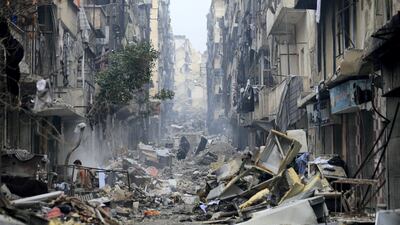Current ceasefire efforts in Syria are doomed to failure unless European states focus on devolution rather than on removing president Bashar Al Assad, a new report says.
While Mr Assad’s continued rule is a bitter pill to swallow, the report by the European Council on Foreign Relations says that there is no alternative if peace is to be achieved in Syria.
“Assad’s continued rule offends the European sense of justice, but Europeans unfortunately have no other choice if they want to bring some peace to Syria,” said Julien Barnes-Dacey, the author of the report.
However, Mr Barnes-Dacey believes there may be a “small window of opportunity” to strike a deal with Mr Assad in which he would agree a devolution of power — a significant step down from his ambitions for total coercive control.
Speaking exclusively to The National, Mr Barnes-Dacey said: "It is very clear that Assad wants to regain control of every inch of Syria. But he nonetheless faces both significant capacity constraints, as well as the reality of foreign backing for different spheres of influence across the country.
“This means that at the moment, he can’t wrest back control of all of Syria. And that gives outside players a degree of leverage to shape a deal.
“What I’m questioning is whether there is an opportunity to do a deal with Assad that concedes his nominal control over all of Syria, in exchange for him granting a degree of local autonomy, on the basis of devolution, in the remaining opposition zones of control.”
_______________
Read more:
Jordan and Russia agree on success of ceasefire in southern Syria
Astana can bring temporary relief for Syria
_______________
The alternative, according to Mr Barnes-Dacey, is for the international community to insist that Mr Assad relinquishes control altogether — something that he says would never succeed.
“Assad is obviously still in a strong position and you’re never going to be able to extract really significant concessions out of him.
“If the basis of the deal is that Assad has to step down, or that he has grant so much local authority that the state moves towards break-up, there is no chance that he will agree. He will simply: ‘I will wait you guys out, until you eventually leave.’”
Comment: The price civilians had to pay for Assad's 'victory'
Given the desperate humanitarian crisis facing the Syrian population, and the fact that the alternative is a continued attempt by Mr Assad to wrest back total control, Mr Barnes-Dacey argues that this is the best potential option. “It’s a compromise,” he added.
The paper also suggests an opening for European action given the lack of a political strategy underpinning Russian and US-led de-escalation efforts.
_________________
Read more: Refugee crisis deteriorating rapidly as 3.5 million children are left without education
_________________
It urges European members of the International Syria Support Group — the EU, France, Germany, Italy, the Netherlands, Spain and the UK — to forge a joint European position, which focuses on injecting viable political vision into the negotiations.
“No one is leading on the political tract at the moment,” Mr Barnes-Dacey said. “There is this Russian and American-led effort to create local ceasefires at the moment, but they are detached from any strategic vision about what that means politically.”
Hassan Hassan: The map of the Syrian war is being redrawn, but don't draw the wrong conclusions from recent regime gains
“The Europeans are increasingly realistic and know that there has to be a change in tack.”
Mr Barnes-Dacey believes that French president Emmanuel Macron’s renewed focus on Syria and support for de-escalation efforts make France the natural leader of this initiative.
“If there is going to be any European push, it has to come out of Paris,” he said. “The British are too preoccupied with Brexit, and no other European state has the political clout to take a lead on this issue.”
Mr Barnes-Dacey is fully aware that the path he outlines is “difficult and uncertain”. He also acknowledges that there are many people who would oppose his suggestion.
“Of course, for Syrians who have lived through the pain and suffering, it’s self-evident that there will be pushback — and understandably so. It’s simply too unpalatable for many of them to accept," he said.
“But the fact remains that no alternative exists at the moment. Assad is still in place, and he has to be part of the solution. The challenge that policymakers face today is to work within that context.”
“The international community faces a fork in the road,” he said. “They can continue to battle on in a scenario in which the odds increasingly favour the regime. Or they can cut a deal with Assad which could open the door towards some sort of sustained de-escalation of tensions.”
He added: “Without a political track, the current ceasefires will surely collapse into renewed violence.”

